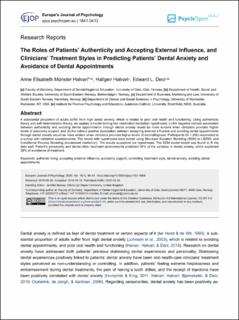The roles of patients' authenticity and accepting external influence, and clinicians' treatment styles in predicting patients' dental anxiety and avoidance of dental appointments
Peer reviewed, Journal article
Published version
Permanent lenke
https://hdl.handle.net/11250/2727219Utgivelsesdato
2020Metadata
Vis full innførselSamlinger
Originalversjon
Halvari, A. E. M., Halvari, H. & Deci, E. L. (2020). The Roles of Patients’ Authenticity and Accepting External Influence, and Clinicians’ Treatment Styles in Predicting Patients’ Dental Anxiety and Avoidance of Dental Appointments. Europe’s Journal of Psychology, 16(1), 45-61. https://doi.org/10.5964/ejop.v16i1.1664Sammendrag
A substantial proportion of adults suffer from high dental anxiety, which is related to poor oral health and functioning. Using authenticity theory and self-determination theory, we applied a model testing two moderated mediation hypotheses: (i) the negative indirect association between authenticity and avoiding dental appointments through dental anxiety would be more evident when clinicians provides higher levels of autonomy support; and (ii) the indirect positive association between accepting external influence and avoiding dental appointments through dental anxiety would be more evident when clinicians provides higher levels of controllingness. Participants (N = 208) responded to a survey with validated questionnaires. The model with hypotheses were tested using Structural Equation Modeling (SEM) in LISREL and Conditional Process Modeling (moderated mediation). The results supported our hypotheses. The SEM model tested was found to fit the data well. Patient’s personality and dental clinic treatment environments predicted 38% of the variance in dental anxiety, which explained 38% of avoidance of treatment.

